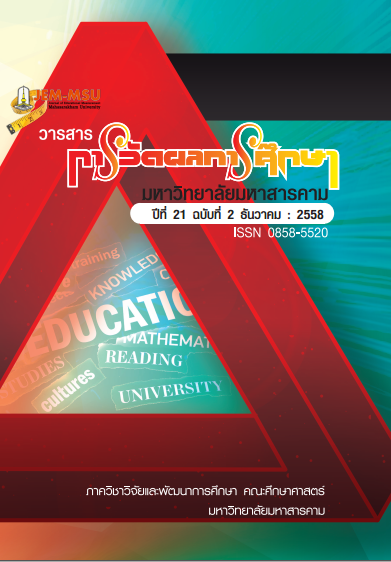An Evaluation of the Learning and Studying Habits of Bachelor’s Students Studying the Health Education Elective Subject at Mahasarakham University, Thailand.
Main Article Content
Abstract
The study and evaluation of students’ learning and activities, and teachers’
teaching methods allows us to verify the efficiency of each, and see which is worthy
of investment. Beside this, it allows us to convey the strengths and weaknesses of
each to the students. The data is also used to improve and develop the process of
activity setting, learning and teaching more efficiently. This research aims to follow
and evaluate the results of students’ learning and teachers’ methods focusing on
Bachelor’s students studying 19 Health Education elective subjects. The sample group
included 368 people from Mahasarakham University, Thailand, in the 2012 academic
year. The group included 351 Bachelor’s degree students from 8 faculties obtained by
cluster sampling, and 17 lecturers obtained by purpose sampling. The instrument
used for the research was questionnaires with 5 score levels, with separate
questionnaires for students and teachers. The student questionnaire had 40 questions
on 5 topics, which had an rxy power value of 0.38-0.77 and efficiency value of 0.96.
The teacher questionnaire had 47 questions on 7 topics and 4 additional construction
observation questions. The statistics used for data analysis were: percentage, mean
and standard deviation. The data was presented by descriptive analysis.
The results were as follows:
1. Objective and subjects group content scope: it was highly suitable.
2. Curriculum management: it was moderately suitable.
3. Setting the teaching persons: it was highly suitable.
4. Subject content: it was highly suitable.
5. Teaching method, activity management, and factors of learning &
teaching support: it was highly suitable.
6. Measuring and evaluation: it was highly suitable.
7. The student quality: it was highly suitable.
8. The teaching teacher side: it was highly suitable.
9. Course prominent points: gives positive results from each subject,
applies to use in routine life, includes a broad range of content, is interesting, not
boring, easy to understand, strange and new and has a suitable budget to support it.
Besides that, teachers have knowledge and ability, skill in each subject, are
enthusiastic, enjoyable and fair in each subject.
10. Weak point was the range of learning is insufficient. Almost all subjects
needed time for practice. The range of specialist teachers is too small, due to small
number of subjects and because of policy. A high ratio between teachers to students,
and students to materials, equipment, and places.
11. Student comments found that the teachers preparing the subjects had
good personality and dressing but the equipment and teaching was only moderately
good. As for teaching environment, it is not fully convenient as some subjects do not
have a local place to learn and teach, so students have to travel to another campus.
Conclusion : Bachelor’s degree students studying health elective subjects
feel that the subjects are high quality in most areas, but need improvement in the
support and promotion of learning and teaching. Teachers believe that improving the
curriculum using these study results can help the students’ educational outcomes.
Article Details
The content and information contained in the published article in the Journal of Educational Measurement Mahasarakham University represent the opinions and responsibilities of the authors directly. The editorial board of the journal is not necessarily in agreement with or responsible for any of the content.
The articles, data, content, images, etc. that have been published in the Journal of Educational Measurement Mahasarakham University are copyrighted by the journal. If any individual or organization wishes to reproduce or perform any actions involving the entirety or any part of the content, they must obtain written permission from the Journal of Educational Measurement Mahasarakham University.

